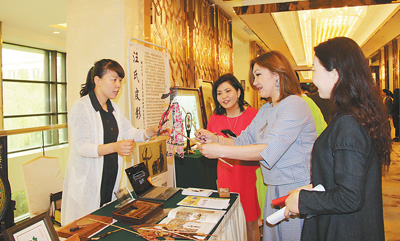Forum held as a prelude to SCO Summit 2018

The first Shanghai Cooperation Organization People’s Forum was held from April 9 to 10 in Xi’an, capital of Shaanxi Province. Pictured above are a few delegates from Central Asian countries experiencing the Shadow Show art on the sidelines of the meeting. (PEOPLE’S DAILY)
Non-governmental communication is not only an important part of cooperation between member states of the Shanghai Cooperation Organization (SCO) but also a crucial force that drives the development of the organization.
From April 9 to 10, the First Shanghai Cooperation Organization People’s Forum, co-hosted by China NGO Network for International Exchanges, the country’s largest NGO network specialized in international exchanges and cooperation, and Shaanxi Provincial People’s Government, was convened in Xi’an, Shaanxi Province.
The forum was convened as one of the preludes to the SCO Summit 2018 that will be held in Qingdao, Shandong Province. The documents produced at the forum will be submitted to the SCO Secretariat to be used as a reference for the SCO summit.
Vice-Chairman of the Standing Committee of the 13th National People’s Congress (NPC) Ji Bingxuan attended the opening ceremony and delivered a keynote speech. Governor of Shaanxi Province Liu Guozhong, former Prime Minister of Nepal Madhav Kumar Nepal, Vice-Minister of the International Department of the CPC Central Committee and Counselor of China NGO Network for International Exchanges Wang Yajun, and SCO Deputy Secretary-General Nurlan Akkoshkarov respectively delivered a speech.
Themed “Promoting Regional Peace and Development, Building a Community with a Shared Future for Mankind: Mission of Non-governmental Organizations,” the forum invited more than 80 guests from 12 countries, including the former political leaders from SCO member states, observer states and dialogue partners, as well as representatives from NGOs, think tanks, media and the SCO Secretariat. They gathered to explore the way that non-governmental organizations take advantage of their own distinctions to foster regional peace, stability and prosperity.
With joint efforts from different parties, the SCO has developed into a participant in the modern system of international relations with crucial influence, playing an indispensable role in promoting the processes of democratization of international relations, as well as in reforming and improving the global governance system.
According to Nurlan Akkoshkarov, the fact that China, as the host country that assumed the rotating presidency of the SCO, proposed and hosted the forum showed the country’s efforts to promote regional development in collaboration with social forces on a wide scale. The NGOs are a crucial force that allows people from the member states to participate in public affairs and that drives economic and social development. The SCO supports the NGOs of each member state to strengthen communication and enhance exchanges, as well as to contribute their wisdom and strength in building a sustainably stable peace and security environment, in constantly improving the wellbeing of people from each member state, and in fostering global economic governance.
Akkoshkarov went on to say that in June 2017, at the SCO Summit in Astana, India and Pakistan formally joined SCO as full members, marking the organization’s entry into a new stage. “We have every reason to believe that, with the admission of new members, the SCO will gain momentum and its development prospects will be broader. It will surely play a bigger and more positive role in Eurasian regional affairs and global affairs of the 21st century,” Akkoshkarov said.
(edited by CHEN MIRONG)
